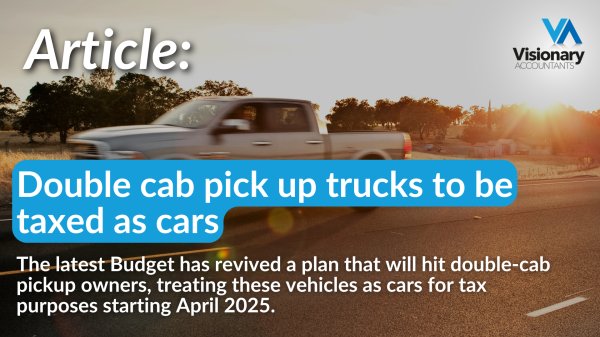Our accountants know plenty of builders and sole traders in St Albans and Watford that are going to hate the new tax rules for double-cab pickup truck owners.
Our accountants in St Albans and Watford are already advising clients on how to minimise the impact of these changes and find tax-saving opportunities.
The latest Budget has revived a plan that will hit double-cab pickup owners, treating these vehicles as cars for tax purposes starting April 2025, with transitional benefit-in-kind arrangements applying. If your business relies on double-cab pickups with a payload of one tonne or more, this change will affect capital allowances, benefits in kind, and deductions from profits – increasing costs for employers and employees alike.
Previously postponed due to strong opposition, this re-introduction could mean higher income tax liabilities for employees using double cabs as company vehicles and increased Class 1A NIC costs for employers.
On 19 February 2024, HMRC removed the changes issued in respect of the tax treatment on double-cab pickups (DCPUs), which was initially updated on 12 February 2024 following a 2020 Court of Appeal judgment.
Then, following the Autumn Budget in October 2024, the government has stated that DCPUs will no longer be treated as commercial vehicles from 6th April 2025.
Read the HMRC EIM23151 - Car benefit: double cab pickups 6 April 2025 onwards guidance, stating that from 6 April 2025, DCPUs with a payload of one tonne or more will be treated as cars rather than commercial vehicles for both capital allowances and benefit-in-kind purposes.
If you need advice on how this will affect your tax liabilities, our accountants in St Albans and Watford are here to help.
Pragmatic and board brush approach
The historical approach of using the VAT definitions (based on payload), in contrast with the Court of Appeal case, concluded that the primary suitability of the vehicle was the determining factor, so whilst HMRC’s use of the VAT definitions was a pragmatic and broad brush approach, the Coca-Cola outcome could not be ignored.
The current treatment (based on payload alone) will continue to apply to purchases or leases up until 5 April 2025. Therefore, any vehicles purchased and made available to the business prior to 5 April 2025 will still qualify for a 100% capital allowance tax deduction as qualifying plant and machinery, under either full expensing (if new and unused) or annual investment allowance.
The guidance states that transitional Benefit in Kind arrangements will be applicable to employers that have purchased, leased or ordered a DCPU before 6 April 2025. They will be able to use the previous treatment, until the earlier of either disposal, lease expiry or 5 April 2029.
Employees that use the vehicles purchased prior to 6 April 2025 for private use will continue to be subject to the reduced commercial vehicle benefit in kind rates, which for 23/24 is set at £3,960 multiplied by the employees' marginal rate of tax.
Whether you’re in St Albans, Watford, or nearby, our team specialises in navigating transitional arrangements to help you maximise your tax savings.
VAT Cul-du-Sac
For now, there has been silence with regard to whether the VAT treatment will change to reflect the revised definitions of a double-cab for direct tax purposes.
The current VAT treatment stems from an informal “administrative agreement” which HMRC enters into with various trade bodies and associations, and exists to simplify and standardise the treatment of a particular transaction, for example, the reclaiming of 50% input tax on lease rental fees is one such agreement, as is the valuation of removable goods in a caravan.
Agreement number 23 deals with the payload definition for VAT and at the end of this agreement it states: “This agreement will be reviewed in the event of a significant change of circumstances, for example, a change of VAT law or significant changes in the market.”
So far, there has been no update on whether VAT will now be brought into line with the direct tax definitions, but as we also know, VAT does not always mirror direct tax, so we could end up with DCPU’s being treated as cars for direct tax but as commercial vehicles for VAT.
Despite VAT's traditional disregard for following direct tax logic, I think that this is one such anomaly that HMRC will need to remedy.
If the motive is to make ownership of DCPUs a disincentive from a tax perspective, then it makes little sense leaving a tax advantage open by allowing input tax recovery on something that HMRC now considers to be a car.
Businesses in St Albans and Watford should consider whether these potential VAT changes could further complicate their tax situation. If you need advice, our accountants can guide you through.
Action for Employers
Employers need to plan ahead for any new vehicles or replacement vehicles they would have provided that may be caught by these rule changes. Otherwise, they and their employees could be in for a nasty shock.
Businesses in St Albans and Watford should act now. Our accountants can provide tailored advice to help you avoid costly surprises and find strategies for tax savings.
Need advice on how to adapt your business to these changes? Contact our accountants in St Albans for expert guidance on tax savings and compliance.
